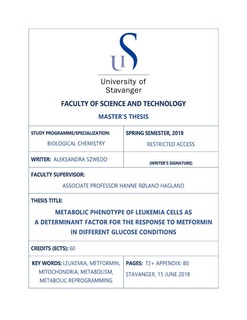| dc.contributor.author | Szwedo, Aleksandra | |
| dc.date.accessioned | 2018-10-18T07:18:04Z | |
| dc.date.available | 2018-10-18T07:18:04Z | |
| dc.date.issued | 2018-06-15 | |
| dc.identifier.uri | http://hdl.handle.net/11250/2568545 | |
| dc.description | Master's thesis in Biological Chemistry | nb_NO |
| dc.description.abstract | Cancer cells are known to have highly dysregulated metabolic pathways and altered mitochondria which governs their limited capability of adaptation to nutritional growth conditions. Metabolic flexibility can be reduced by usage of metabolic modulators, like metformin, inhibitor of mitochondrial C‒I. Metformin was shown to be associated with reduced risk of cancer development and better overall prognosis. In this study the role of endogenous metabolic phenotype of two leukemia cell lines, HL-60 and Jurkat, was addressed as a determinant factor underlying the response to different glucose growth conditions and metformin treatment. Glucose deprivation was shown to exert anti-proliferative effect in both cell lines, howbeit, stronger in glycolytic Jurkat cell line. Cell line-specific response to metformin was modulated by different glucose concentration. Glucose starvation had a sensitizing effect to the anti-proliferative effect of metformin in both cell lines, however, more pronounced in OXPHOS dependent HL-60. Metabolic stress in HL-60 was reflected by significantly reduced viability and increased reactive oxygen species (ROS) formation. In general, high glucose concentration had a masking effect on the action of metformin, however, it did not protect Jurkat cells against the oxidative stress seen in notably elevated ROS level. To sum up, metabolic reprogramming by glucose concentration alteration was shown to affect the cellular response to mitochondria-targeted drug, metformin and was dictated by the endogenous metabolic capability of the leukemia cell lines. Impairment of mitochondrial respiration appears to be detrimental in both cell lines of different metabolic profiles, hence, underscoring its importance in metabolic flexibility. | nb_NO |
| dc.description.sponsorship | University of Stavanger | nb_NO |
| dc.language.iso | eng | nb_NO |
| dc.publisher | University of Stavanger, Norway | nb_NO |
| dc.relation.ispartofseries | Masteroppgave/UIS-TN-IKBM/2018; | |
| dc.subject | biologisk kjemi | nb_NO |
| dc.subject | kreftceller | nb_NO |
| dc.subject | leukemi | nb_NO |
| dc.subject | mitochondria | nb_NO |
| dc.subject | leukemia | nb_NO |
| dc.title | Metabolic phenotype of leukemia cells as a determinant factor for the response to metformin in different glucose conditions | nb_NO |
| dc.type | Master thesis | nb_NO |
| dc.description.version | submittedVersion | nb_NO |
| dc.subject.nsi | VDP::Matematikk og Naturvitenskap: 400::Kjemi: 440 | nb_NO |
| dc.subject.nsi | VDP::Matematikk og Naturvitenskap: 400::Basale biofag: 470::Biokjemi: 476 | nb_NO |
